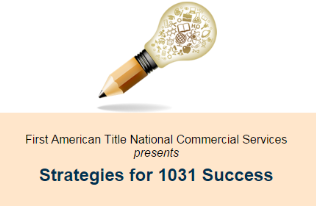
In some regions of the country it is common for attorneys to act as closing agents in connection with the sale and purchase of real estate. When acting as a closing agent, the attorney receives the purchase price from the buyer and, once the closing occurs, disburses it to the seller. If you are doing a 1031 exchange and your attorney acts as the closing agent, is this a problem?
IRC Section 1031
Under IRC Section 1031 and the deferred exchange regulations, a taxpayer can defer taxes by selling his relinquished property and acquiring replacement property at a later date, and provided that all of the rules are followed, the transaction is considered an exchange rather than a sale followed by a purchase. For this to happen, the taxpayer cannot have actual or constructive receipt of the proceeds from the sale (the “exchange funds”).
Acquiring Replacement Property
Since in most cases the buyer’s attorney handles the closing, this issue comes up most often when the buyer is completing his exchange by acquiring the replacement property. One view is that the buyer’s attorney is the agent of the taxpayer and may compromise the exchange if he handles the exchange funds when closing the deal. The opposing view is that the buyer’s attorney should be able to handle the funds because he is acting as closing agent with duties to all parties, not just to the buyer.
Practical Solutions
If your attorney or you are concerned about this issue, and you want to have the attorney continue to act as the closing agent, one solution is to have the purchaser’s qualified intermediary send the exchange funds directly to the seller. Other common options are to have the title insurance underwriter, an escrow company or an attorney who is not an agent of the taxpayer handle the receipt and disbursement of the funds.
Can my Attorney be my Qualified Intermediary?
A separate, but related, question is whether a taxpayer’s attorney may act as the intermediary in his exchange. The IRS rules provide that an attorney cannot act as a qualified intermediary for a client if the attorney has performed services for the client any time during the two year period ending on the date the relinquished property closes, unless those services are limited to the client’s 1031 exchange.
A cautious attorney will consider alternatives before handling funds on either side of his client’s exchange transaction and will seek the assistance of a qualified intermediary instead of attempting to act in that capacity. At First American Exchange, we can help find solutions to these and other issues that often come up in a taxpayer’s exchange. Please contact us if we can be of assistance.
References: Reed v. Commissioner of Internal Revenue, 723 F2d 138 (1st Cir. 1983) Reg. Section 1.1031(k)-1(k)(2).



